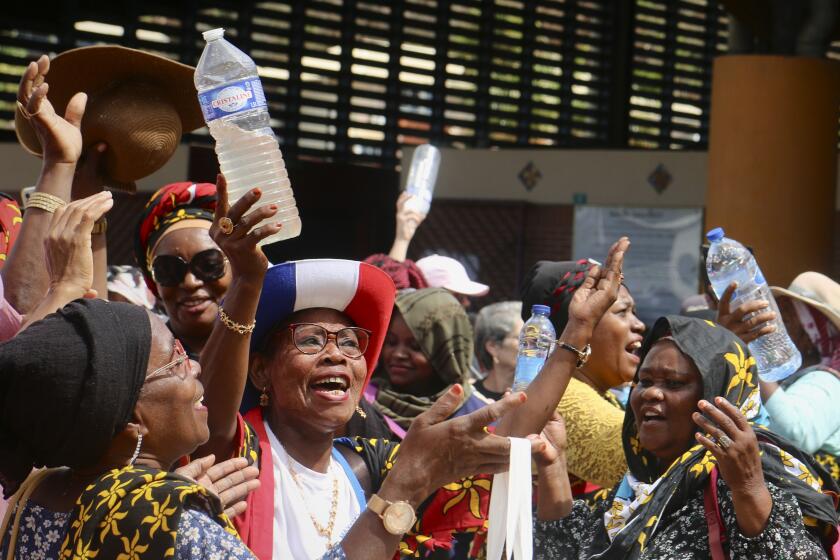‘Several hundred,’ perhaps thousands, dead after cyclone strikes French territory, official says

- Share via
CAPE TOWN, South Africa — The death toll in the French territory of Mayotte from Cyclone Chido is “several hundred” and may run into the thousands, the island’s top government official told a local broadcaster Sunday.
France rushed rescue teams and supplies to its largely poor overseas department in the Indian Ocean that has suffered widespread destruction.
“I think there are some several hundred dead, maybe we’ll get close to a thousand. Even thousands ... given the violence of this event,″ Mayotte Prefect François-Xavier Bieuville told TV station Mayotte la 1ere.
He had previously said it was the worst cyclone to hit Mayotte in 90 years.
Bieuville said it was extremely difficult to get an exact number of deaths and injuries after Mayotte was pummeled by the intense tropical cyclone on Saturday, causing major damage to public infrastructure, including the airport, flattening neighborhoods and knocking out electricity supplies.
The government is pinning its hopes on the upcoming rainy season, though residents say it won’t be enough to fix the deep-seated water problems.
The French Interior Ministry confirmed at least 11 deaths and more than 250 injuries earlier Sunday but said that was expected to increase substantially.
Mayotte in the southwestern Indian Ocean off the coast of Africa is France’s poorest island and the poorest territory in the European Union. It has a population of just over 300,000 spread over two main islands.
Bieuville said the worst devastation had been in the slums of metal shacks and informal structures that mark much of Mayotte. Referring to the official death toll so far, he said ″this figure is not plausible when you see the images of the slums.”
“I think the human toll is much higher,” he added.
Mayotte took the brunt of Chido
Chido blew through the southwestern Indian Ocean on Friday and Saturday, also affecting the nearby islands of Comoros and Madagascar. Mayotte was directly in the cyclone’s path, though, and took the brunt. Chido brought winds in excess of 136 mph, according to the French weather service, making it a Category 4 cyclone, the second strongest on the scale.
Tensions have been rising in the French Pacific territory New Caledonia after four months of deadly unrest.
Later, Chido made landfall in Mozambique on the African mainland and there were fears for more than 2 million people in the country’s north who could be affected, according to authorities there.
French President Emmanuel Macron said his “thoughts” were with the people of Mayotte, and Interior Minister Bruno Retailleau was due to travel to Mayotte on Monday. Retailleau had warned Saturday night after an emergency meeting in Paris that the death toll “will be high,” while new Prime Minister François Bayrou, who took office on Friday, said infrastructure had been severely damaged or destroyed across Mayotte.
Pope Francis offered prayers for the victims while on a visit Sunday to the French Mediterranean island of Corsica.
France wants to open an air and sea bridge to Mayotte
Rescuers and firefighters were sent from France and the nearby French territory of Reunion and supplies were also rushed in on military aircraft and ships. Damage to the airport’s control tower meant only military aircraft were able to fly in.
Patrice Latron, the prefect of Reunion, said authorities aim to establish an air and sea bridge from Reunion to Mayotte. About 800 more rescuers were to be sent in the coming days and more than 80 tons of supplies had been flown in or were on their way by ship. Some of the priorities were restoring electricity and access to drinking water, Latron said.
The French Interior Ministry said 1,600 police and gendarmerie officers have been deployed to “help the population and prevent potential looting.”
In some parts of Mayotte, entire neighborhoods of metal shacks were flattened, while residents reported trees had been uprooted, boats were flipped or sunk, and many areas were without power.
French President Emmanuel Macron headed to New Caledonia to seek a political solution to the deadly violence that has rocked the French archipelago.
Chad Youyou, a resident in Hamjago in the north of the island, posted videos on Facebook showing the extensive damage in his village and across the surrounding fields and hills, where almost every tree had been leveled.
“Mayotte is destroyed … we are destroyed,” he said.
The cyclone slams into northern Mozambique
Chido continued its eastern trajectory and into northern Mozambique where it continued to cause serious damage, while landlocked Malawi and Zimbabwe warned they might have to evacuate people because of flooding.
In Mozambique, UNICEF said Cabo Delgado province, home to around 2 million people, was the first region to be hit and many homes, schools and health facilities were partially or completely destroyed.
UNICEF Mozambique spokesman Guy Taylor said that communities faced the prospect of being cut off from schools and health facilities for weeks, and Mozambique authorities warned there was a high danger of landslides.
The migrants had been at sea for nearly a month hoping to reach the French island territory of Mayotte.
December through to March is cyclone season in the southwestern Indian Ocean, and southern Africa has been pummeled by a series of strong ones in recent years. Cyclone Idai in 2019 killed more than 1,300 people, mostly in Mozambique, Malawi and Zimbabwe. Cyclone Freddy left more than 1,000 dead across several countries in the Indian Ocean and southern Africa last year.
The cyclones bring the risk of flooding and landslides, but also stagnant pools of water may later spark deadly outbreaks of the waterborne disease cholera as well as dengue fever and malaria.
Studies say the cyclones are getting worse because of climate change. They can leave poor countries in Africa, which contribute only a tiny amount to global warming, having to deal with large humanitarian crises, underlining their call for more help from wealthy nations to deal with the impact of climate change.
Imray and Corbet write for the Associated Press. Corbet reported from Paris.
More to Read
Sign up for Essential California
The most important California stories and recommendations in your inbox every morning.
You may occasionally receive promotional content from the Los Angeles Times.














